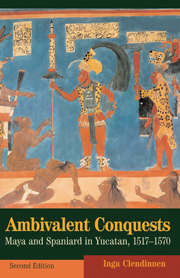Book contents
- Frontmatter
- Contents
- List of illustrations
- Preface to the second edition
- Preface to the first edition
- Acknowledgments
- Map I Yucatan in the conquest period
- Part I Spaniards
- 1 Explorers
- 2 Conquerors
- 3 Settlers
- 4 Missionaries
- 5 Conflict
- 6 Crisis
- 7 Attrition
- 8 Retrospections
- Epilogue: The hall of mirrors
- Part II Indians
- Epilogue: Confusion of tongues
- Appendix: A sampler of documents
- Glossary of Spanish and Maya terms
- Notes
- Select bibliography
- Index
3 - Settlers
Published online by Cambridge University Press: 05 October 2013
- Frontmatter
- Contents
- List of illustrations
- Preface to the second edition
- Preface to the first edition
- Acknowledgments
- Map I Yucatan in the conquest period
- Part I Spaniards
- 1 Explorers
- 2 Conquerors
- 3 Settlers
- 4 Missionaries
- 5 Conflict
- 6 Crisis
- 7 Attrition
- 8 Retrospections
- Epilogue: The hall of mirrors
- Part II Indians
- Epilogue: Confusion of tongues
- Appendix: A sampler of documents
- Glossary of Spanish and Maya terms
- Notes
- Select bibliography
- Index
Summary
The institutions evolved in the long struggle against the Moors in homeland Spain had the attraction of obvious appropriateness to the conquerors on Spain's frontiers in the Americas. In Yucatan Montejo deployed notions of government derived from Spain's medieval and unequivocally military past. His own title of adelantado, and the extensive judicial, military and executive powers which went with it identified him with the Marcher Lords of the Reconquista, who had also directly represented the Crown in their frontier zones. When Montejo exercised that authority to establish government of the new territories he drew on another institution of the Reconquista, the encomienda, used throughout Spain's American empire in its first phase. The essential form of the encomienda was simple enough. The Crown, or in this case, the Crown's delegate, granted to an individual worthy of reward the right to exact tribute and labour from a specified number of royal tributaries. In return the grantee, or encomendero, undertook to care for the material and spiritual well-being of his charges, and to maintain himself in readiness for military service. The neat economy of such a system, providing as it did instant rewards to the conquerors with instant control and exploitation of the conquered, was as irresistible in Yucatan as it had been elsewhere in the Indies: by the close of 1545 Montejo had parcelled out the native towns and villages of the peninsula in encomienda grants among his followers.
- Type
- Chapter
- Information
- Ambivalent ConquestsMaya and Spaniard in Yucatan, 1517–1570, pp. 38 - 44Publisher: Cambridge University PressPrint publication year: 2003



